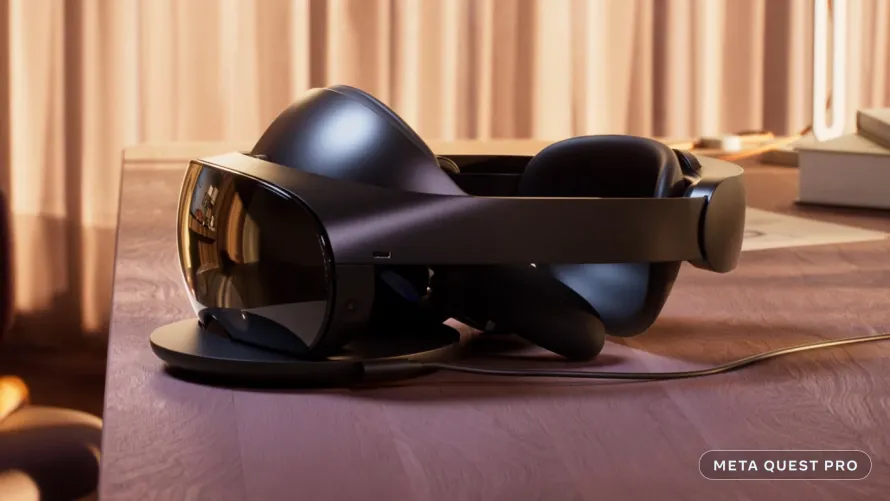In brief
- Meta showcased its latest metaverse announcements at its Connect conference.
- Co-founder and CEO Mark Zuckerberg said that an “open, interoperable metaverse” will be “better for everyone.”
Last October, Meta—the rebranded parent company of Facebook and Instagram—unveiled its grand plan to help build the future immersive internet of the metaverse. Since then, the social media giant’s stock price has fallen by 60%, its growth has stalled, and metaverse buzz has both surged and cooled, drawing backlash in the process.
Despite all of that, Meta is still fixated on building its vision. Today, the company used its annual Meta Connect conference keynote to share its latest advancements for the metaverse, including a powerful new virtual reality (VR) headset to serve as another stepping stone towards more lavish online worlds and interactions.
Some Web3 builders have feared Meta’s role in building the metaverse, expecting the social media firm to develop another “walled garden” or closed ecosystem. But the company has gradually shifted its messaging to suggest a different approach. Today, co-founder and CEO Mark Zuckerberg took his firmest stance yet regarding the potential of an open metaverse.
Zuckerberg talked about the history of open and closed ecosystems across past computing eras, noting that “closed ecosystems focus on tight control and integration” and that such platforms ultimately claim most of the created value. When it comes to the metaverse, however, Zuckerberg made clear that Meta values a different approach.
“I strongly believe that an open, interoperable metaverse built by many different developers and companies is going to be better for everyone,” he said.
Granted, that’s not the same as unambiguously stating that Facebook’s metaverse will be built on blockchain technology, work with NFT assets built on public blockchain platforms like Ethereum and Solana, or support cryptocurrencies. But it’s an acknowledgment that Meta isn’t billing itself as the sole or primary builder of the metaverse.
Nick Clegg, Meta’s President of Global Affairs, shared similar comments in an essay published in May. Zuckerberg also said in a podcast interview at the time that he’s open to interoperability in the metaverse—but didn’t firmly detail the company’s plans in that regard.
Today, Zuckerberg spoke of interoperability for avatar customizations, but that may simply mean that apparel and accessories can be carried over to other platforms that support Meta’s avatar tech, rather than used freely with other types of NFT-based avatars.
Over the past several months, Meta has embraced NFT collectibles from leading platforms like Ethereum, Polygon, and Flow, launching integrations with Facebook and Instagram that let users showcase their owned NFT assets to friends and followers. Will Meta also embrace the existing NFT ecosystem when it comes to building its metaverse platform?
Many Web3 builders have been skeptical.
Last year, Yat Siu of Animoca Brands—a leading metaverse investor—told Decrypt that tech giants like Facebook and Tencent are “a threat” to an open, interoperable metaverse, and others in the space have shared similar concerns.
Zuckerberg’s comments today don’t clearly indicate that Meta plans to build arm-in-arm with Web3 creators and completely embrace open-source tech, but it’s the strongest signal yet that the Facebook firm is attempting a major pivot in how it designs online platforms.
Meta's latest moves
Elsewhere in the keynote address, Meta made a number of announcements that suggest ongoing progress towards bringing its metaverse vision to life on both the hardware and software fronts.
On the hardware front, Meta revealed the Quest Pro, a much more powerful standalone VR headset that’s targeted at business users and professionals. Unlike the current $400 Meta Quest 2 headset designed for consumers, the Meta Quest Pro will sell for $1,500 and pack considerably more graphical power to deliver robust VR experiences.

But it’s more than a VR-centric headset. The mixed reality device will also support augmented reality experiences, and can overlay digital content on a user’s view of the real world. It uses sharper external cameras to enable that feature, plus it integrates inward-facing sensors to recreate users’ facial expressions and allow for eye tracking functionality.
Meta’s play towards the metaverse is focused on more than just hardware, however: the firm is also developing the software and infrastructure to someday launch its planned unified online 3D platform designed for work, play, socializing, shopping, and more.
The firm’s current Horizon Worlds VR app will be expanded to the web, Meta announced today, with the ability for users to join via a computer or touch device. That may signal Meta’s plan to expand its current VR experience into a multi-platform world that could eventually transform into something matching the demo first shown last year.
Granted, that announcement comes following the publication of a report that suggests that Horizon Worlds has significant bugs and quality issues, and that Meta's own employees rarely use the platform. There may be significant work ahead to not only improve the experience, but also make it compatible with other devices.
Meta is also working on more detailed avatars that can be used across its apps, including Horizon Worlds, Instagram, and WhatsApp. And in 2023, they’ll even gain legs. Currently, Meta’s Horizon Worlds avatars are simply floating torsos, but the firm is developing A.I. tech to generate digital legs based on predictive algorithms.
Additionally, Meta announced a major new partner in tech giant Microsoft, which will initially bear fruit in a couple of key ways.
Microsoft will bring immersive versions of Windows, Teams, Office, and Xbox Game Pass to the Quest VR platform, while Meta’s avatar system will be integrated into Teams. That kind of cross-compatibility could signal further metaverse moves to come. Meta previously showed how the metaverse could be used for collaborative remote work across virtual screens.
Despite pushback against its budding metaverse endeavors, it’s clear from today’s presentation that Meta isn’t backing down. And in an interview with The Verge, Mark Zuckerberg reiterated that it will be a deliberate investment and building process, describing it as a “long-term journey” and that it could take several years for the tech to mature.
In fact, Meta also teased some future technologies in the keynote that are intended for the metaverse, including photo-real 3D avatars built from smartphone scans, as well as interfaces and control systems built around subtle finger movements. Those features are still prototypes and may not ultimately be integrated into finished products.
Meta’s plan for the metaverse could still be years away from completion at scale, but today’s keynote provided some notable updates on the tech—and potentially changed the tone around the social media firm’s approach.

